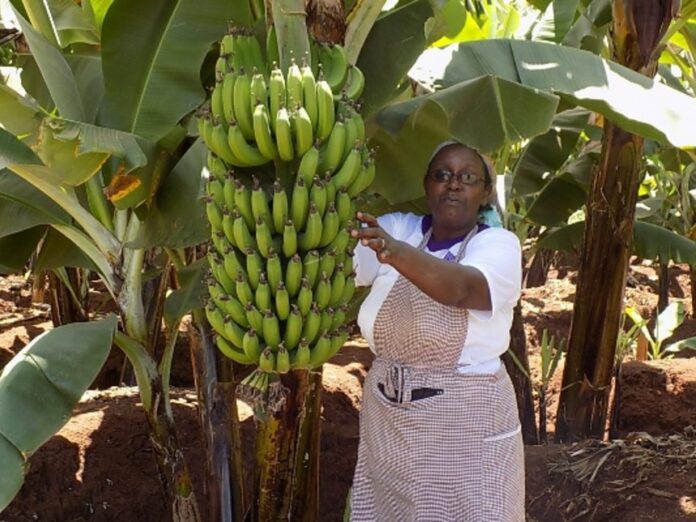Fleciah Wambui Kinyua is one of the most successful banana farmers from Mukinduri area in Kerugoya, Kirinyaga county. She has won two key prizes for being a successful banana farmer in the area.
“I ventured into banana farming in the year 2009. Before then, I was growing tomatoes and cabbages but I came to realise it was tedious compared to banana farming,” says the 2014 Women in Agriculture overall champion.
Wambui, who is 55, says she is not about to quit because she has seen the benefits. Her banana cash foots all her bills, including putting food on the table and educating her children.
“I attended several exhibitions and Agricultural Society of Kenya’s shows and was attracted to the banana being exhibited. I immediately made up my mind and started growing bananas,” she reveals.
Wambui says she started with 100 plantlets which she bought from Jomo Kenyatta University of Agriculture and Technology and Aberdare Technologies at between Sh100 and Sh120 each.
After this, the mother of two shared tissue culture banana farming ideas with several other farmers in her village who supported her thought and started Karinga Tissue Culture Banana Growers group that she chairs until now. The group helps its members source market for their products.
Currently, the group sells their bananas at Sh15 per kilo but Wambui says the cash per kilo drops to Sh12 when fruits like mango are in season. She grows Grand 9, FIA 17 and Williams banana varieties that are high in demand and do well in the areas.
Her 18 months of waiting for the bananas to mature and be ready for harvest were worth it as most of her bananas weighed at least 60 kgs and above in the first harvest.
“I was impressed and increased the number of stools to the current 1, 200 in my two acres of land. I intend to add three more acres for banana farming,” she adds.
In September last year some officers from the ministry of agriculture visited her farm and told her that they were judging farms for consideration to exhibit at the ASK show. Her farm emerged the best not only in her sub-county but also in the country, where she won the small-scale farmer presidential award.
Wambui uses square banana farming technique where stools are grown in square pieces grows them in a spacing of 9 by 9 feet.
“This spacing ensures your bananas get enough light triggering to quality harvest. Space is not only the factor to be considered, we also apply 40 kgs of compost manure per stool annually,” she says, adding that during sunny days, they also water 40 litres of water per stool on weekly basis.
Wambui recently sold one tonne of bananas. Their group sells bananas on weekly basis. “We use banana leaves and stems to make compost manure for our farms but soon we will start making hats, wallets, trays and bags among other things. I believe this will be subject to getting more money,” she says.
She says water is important in banana farming and that is why she drilled a borehole in her compound for farming.
Wambui says diseases like cigar end rot and pests like thrips affect bananas and their quality.
Christine Mwai, the Inoi ward agricultural extension field officer, advises that to maintain quality harvests, a farmer should keep pruning leaving at least four or five healthy plantlets in each hole.
The officer adds that the varieties of the bananas that Wambui grows are resistant to cigar end rot disease. “Grand 9 and Williams are best in this area since they are not affected by cigar end rot disease. Thrips causes silvery patches on fruits which later turns brown. This can be controlled by removing of male flowers and covering of bunches,” says Mwai.
Wambui says that besides being able to provide for her family, she has been able to create full-time employment for three people. “One can lease land to grow bananas for at least seven years. Before end of this time, the farmer will have cultivated enough,” she advises.








